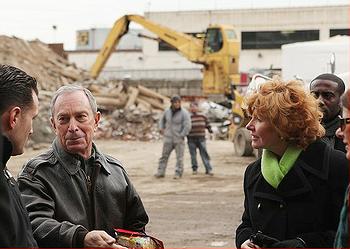
NEW YORK, New York, May 7, 2013 (ENS) – A network of large cities committed to addressing climate change is developing a new framework that will help all cities better prepare for natural disasters and severe weather incidents.
The C40 Cities Climate Leadership Group Monday announced the new framework as a new Clinton Global Initiative Commitment to Action.

At the Clinton Global Initiative mid-year meeting Monday, former President Bill Clinton, former Secretary of State Hillary Clinton, Chelsea Clinton, Rio de Janeiro Mayor Eduardo Paes, and C40 Chair New York Mayor Michael Bloomberg took part in a roundtable of C40 Mayors and executives from banking, insurance, and engineering corporations seeking a common language to measure and manage climate risk.
“In the wake of Hurricane Sandy and the recent floods in Jakarta and Sao Paulo, it is clear we need to empower cities to take the necessary actions to protect their citizens, infrastructure and economies from the devastating impacts of natural disasters,” said C40 Chair, New York City Mayor Michael Bloomberg.
The new C40 Risk Assessment Framework will create a common approach for cities to assess climate risk and provide a process to help cities prioritize risk before investing in climate actions.
Roundtable participants explored opportunities for investing in adaptation to climate change, building resilient urban infrastructure, and mitigating risk.
The discussion centered around how public and private sectors can collaborate to help cities be better prepared for natural disasters and severe weather incidents over the long term.
“While a growing number of cities have efforts underway to measure climate risk, there is a high degree of uncertainty and variability in their methodologies and approaches,” said Mayor Bloomberg. “The C40 Risk Assessment Framework, by creating a common approach to this challenge, will become the global standard by which all cities measure and manage climate risk.”

Such a global standard is intended to enable cities to assess local climate risks with confidence, allow for local prioritizing of investments to mitigate those risks and achieve comparability between cities.
A Risk Assessment Framework would enable banks to better structure lending for resilient infrastructure, and the develop standards for accessing adaptation-linked finance.
Insurance companies would be able to value risk in a uniform way, ensuring continued investment in urban infrastructure.
The development of the Risk Assessment Framework will be guided by the new Climate Risk Assessment Network, which will bring together C40 Cities and outside partners such as lending institutions, technical experts, and the insurance industry.
The first gathering of the Climate Risk Assessment Network will take place in Rotterdam on June 5-6 to lay the groundwork and next steps for growing the framework.
The Risk Assessment Framework draws on C40’s successful efforts to develop a common global standard for measuring community-scale greenhouse gas emissions, said Bloomberg.
The C40 Cities Climate Leadership Group was established in 2005 and expanded in 2006 through a partnership with President William J. Clinton’s Climate Initiative.
Copyright Environment News Service (ENS) 2013. All rights reserved.
© 2013, Environment News Service. All rights reserved. Content may be quoted only with proper attribution and a direct link to the original article. Full reproduction is prohibited.
